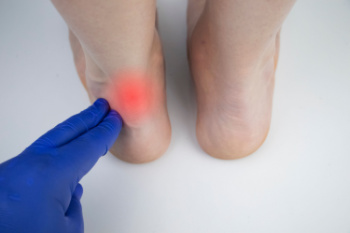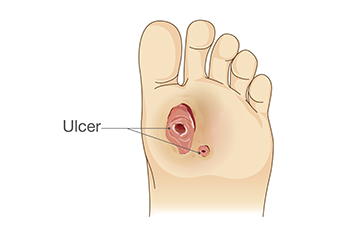Connect With Us
Blog
Items filtered by date: May 2025
Achilles Tendon Rupture and Its Causes

An Achilles tendon rupture is a tear in the tendon that connects the calf muscles to the heel bone. This injury often occurs during activities that involve sudden starts, stops, or changes in direction. Common causes include intense physical activity, improper stretching, or direct trauma to the tendon. Risk factors may include age, lack of conditioning, certain medications, or previous tendon problems. Symptoms of a rupture may include a sudden sharp pain in the back of the ankle, difficulty walking, or an inability to rise on the toes. Some individuals report hearing or feeling a pop at the time of injury. If you have sustained an Achilles tendon injury, it is suggested that you consult a podiatrist as prompt diagnosis and treatment can help restore function and prevent long-term complications related to mobility and strength.
Achilles tendon injuries need immediate attention to avoid future complications. If you have any concerns, contact one of our podiatrists of Mt Rose Foot & Ankle Specialists. Our doctors can provide the care you need to keep you pain-free and on your feet.
What Is the Achilles Tendon?
The Achilles tendon is a tendon that connects the lower leg muscles and calf to the heel of the foot. It is the strongest tendon in the human body and is essential for making movement possible. Because this tendon is such an integral part of the body, any injuries to it can create immense difficulties and should immediately be presented to a doctor.
What Are the Symptoms of an Achilles Tendon Injury?
There are various types of injuries that can affect the Achilles tendon. The two most common injuries are Achilles tendinitis and ruptures of the tendon.
Achilles Tendinitis Symptoms
- Inflammation
- Dull to severe pain
- Increased blood flow to the tendon
- Thickening of the tendon
Rupture Symptoms
- Extreme pain and swelling in the foot
- Total immobility
Treatment and Prevention
Achilles tendon injuries are diagnosed by a thorough physical evaluation, which can include an MRI. Treatment involves rest, physical therapy, and in some cases, surgery. However, various preventative measures can be taken to avoid these injuries, such as:
- Thorough stretching of the tendon before and after exercise
- Strengthening exercises like calf raises, squats, leg curls, leg extensions, leg raises, lunges, and leg presses
If you have any questions please feel free to contact our office located in Reno, NV . We offer the newest diagnostic tools and technology to treat your foot and ankle needs.
Caring for a Diabetic Foot Ulcer

A diabetic foot ulcer is an open wound or sore that develops most often on the bottom of the foot due to complications from diabetes. High blood sugar levels can damage nerves and reduce blood flow, making it difficult for wounds to heal and increasing the risk of infection. These ulcers can begin as small cuts or blisters that may go unnoticed because of decreased sensation in the feet. If left untreated, they can worsen and lead to serious complications. Proper care involves keeping the wound clean and covered, avoiding pressure on the affected area, and managing blood sugar levels carefully. Regular visits to a podiatrist are essential. If you have diabetes, it is strongly suggested that you are under the care of this type of doctor who can treat diabetic foot ulcers and help you to manage this serious condition.
Wound care is an important part in dealing with diabetes. If you have diabetes and a foot wound or would like more information about wound care for diabetics, consult with one of our podiatrists from Mt Rose Foot & Ankle Specialists. Our doctors will assess your condition and provide you with quality foot and ankle treatment.
What Is Wound Care?
Wound care is the practice of taking proper care of a wound. This can range from the smallest to the largest of wounds. While everyone can benefit from proper wound care, it is much more important for diabetics. Diabetics often suffer from poor blood circulation which causes wounds to heal much slower than they would in a non-diabetic.
What Is the Importance of Wound Care?
While it may not seem apparent with small ulcers on the foot, for diabetics, any size ulcer can become infected. Diabetics often also suffer from neuropathy, or nerve loss. This means they might not even feel when they have an ulcer on their foot. If the wound becomes severely infected, amputation may be necessary. Therefore, it is of the upmost importance to properly care for any and all foot wounds.
How to Care for Wounds
The best way to care for foot wounds is to prevent them. For diabetics, this means daily inspections of the feet for any signs of abnormalities or ulcers. It is also recommended to see a podiatrist several times a year for a foot inspection. If you do have an ulcer, run the wound under water to clear dirt from the wound; then apply antibiotic ointment to the wound and cover with a bandage. Bandages should be changed daily and keeping pressure off the wound is smart. It is advised to see a podiatrist, who can keep an eye on it.
If you have any questions please contact our office located in Reno, NV . We offer the newest diagnostic and treatment technologies for all your foot and ankle needs.
Understanding Chronic Plantar Fasciitis

Chronic plantar fasciitis is a common cause of heel pain, especially in active individuals. It occurs when the plantar fascia, the thick band of tissue that runs along the bottom of the foot, becomes inflamed due to repetitive stress or strain. Common causes include overuse, wearing improper footwear, high-impact activities, or an abnormal gait. Symptoms typically include sharp or stabbing pain in the heel, particularly with the first steps in the morning or after prolonged rest. The pain may subside during the day but can return after standing or walking for long periods. A podiatrist can diagnose chronic plantar fasciitis through physical exams and imaging tests. Treatment options include custom orthotics to support the arch, targeted exercises to stretch and strengthen the foot, and anti-inflammatory medication. In more severe cases, injections or even surgery may be necessary. If you are dealing with painful plantar fasciitis, it is suggested that you promptly schedule an appointment to see a podiatrist.
Plantar fasciitis is a common foot condition that is often caused by a strain injury. If you are experiencing heel pain or symptoms of plantar fasciitis, contact one of our podiatrists from Mt Rose Foot & Ankle Specialists. Our doctors can provide the care you need to keep you pain-free and on your feet.
What Is Plantar Fasciitis?
Plantar fasciitis is one of the most common causes of heel pain. The plantar fascia is a ligament that connects your heel to the front of your foot. When this ligament becomes inflamed, plantar fasciitis is the result. If you have plantar fasciitis you will have a stabbing pain that usually occurs with your first steps in the morning. As the day progresses and you walk around more, this pain will start to disappear, but it will return after long periods of standing or sitting.
What Causes Plantar Fasciitis?
- Excessive running
- Having high arches in your feet
- Other foot issues such as flat feet
- Pregnancy (due to the sudden weight gain)
- Being on your feet very often
There are some risk factors that may make you more likely to develop plantar fasciitis compared to others. The condition most commonly affects adults between the ages of 40 and 60. It also tends to affect people who are obese because the extra pounds result in extra stress being placed on the plantar fascia.
Prevention
- Take good care of your feet – Wear shoes that have good arch support and heel cushioning.
- Maintain a healthy weight
- If you are a runner, alternate running with other sports that won’t cause heel pain
There are a variety of treatment options available for plantar fasciitis along with the pain that accompanies it. Additionally, physical therapy is a very important component in the treatment process. It is important that you meet with your podiatrist to determine which treatment option is best for you.
If you have any questions, please feel free to contact our office located in Reno, NV . We offer the newest diagnostic and treatment technologies for all your foot care needs.
We Can Treat Your Foot or Ankle Pain
Signs of Foot Stress Fractures

Stress fractures in the feet are hairline cracks in the bone caused by repetitive stress or overuse, often affecting the long bones of the foot. Stress fractures typically develop gradually, with early signs like localized pain that worsens with activity and improves during rest. Swelling, bruising, and tenderness when pressing on a specific area of the foot may also occur. Runners or other athletes who increase exercise intensity too quickly, wear worn-out shoes, or regularly train on hard surfaces are more likely to develop stress fractures. Women with low bone density may face added risk. A podiatrist can diagnose stress fractures using a clinical exam and imaging tests, such as MRI or bone scans, when X-rays do not reveal the injury. Depending on the severity of the fractures, treatment may involve wearing protective footwear, modified activity, or using crutches to reduce pressure on the affected area. In some cases, surgery may be needed to ensure proper healing. If you have symptoms of stress fractures in the feet, it is suggested that you schedule an appointment with a podiatrist for appropriate treatment options.
Activities where too much pressure is put on the feet can cause stress fractures. To learn more, contact one of our podiatrists from Mt Rose Foot & Ankle Specialists. Our doctors can provide the care you need to keep your pain free and on your feet.
Dealing with Stress Fractures of the Foot and Ankle
Stress fractures occur in the foot and ankle when muscles in these areas weaken from too much or too little use. The feet and ankles then lose support when walking or running from the impact of the ground. Since there is no protection, the bones receive the full impact of each step. Stress on the feet can cause cracks to form in the bones, thus creating stress fractures.
What Are Stress Fractures?
Stress fractures occur frequently in individuals whose daily activities cause great impact on the feet and ankles. Stress factors are most common among:
- Runners
- People affected with Osteoporosis
- Tennis or basketball players
- Gymnasts
- High impact workouts
Symptoms
Pain from the fractures occur in the area of the fractures and can be constant or intermittent. It will often cause sharp or dull pain with swelling and tenderness. Engaging in any kind of activity which involves high impact will aggravate pain.
If you have any questions please contact our office located in Reno, NV . We offer the newest diagnostic and treatment technologies for all your foot and ankle needs.
Blog Archives
- September 2025
- August 2025
- July 2025
- June 2025
- May 2025
- April 2025
- March 2025
- February 2025
- January 2025
- December 2024
- November 2024
- October 2024
- September 2024
- August 2024
- July 2024
- June 2024
- May 2024
- April 2024
- March 2024
- February 2024
- January 2024
- December 2023
- November 2023
- October 2023
- September 2023
- August 2023
- July 2023
- June 2023
- May 2023
- April 2023
- March 2023
- February 2023
- January 2023
- December 2022

